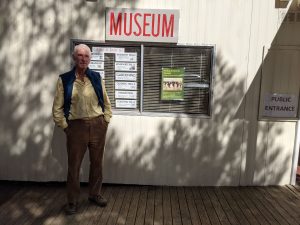Regional newspapers well placed to weather online storm
By GREG CHAMBERLAIN
With the rise of online news, some are predicting the decline of traditional forms of media such as the printed newspaper. And regional newspapers, with their limited resources and smaller readerships, are caught in the crosshairs.
Yet regional parochialism may mean that country newspapers are better placed than their city counterparts to survive the shift.
Australian newspaper circulations continue to fall, with sales in the three months to September 2010 down 3 per cent on the corresponding period in 2009, according to the Audit Bureau of Circulation.
Sales of metropolitan newspapers fell 3.1 per cent on weekdays, 2.9 per cent on Saturdays and 3.5 per cent on Sundays. Monday-to-Saturday sales of national newspapers dropped 1.1 per cent. Monday-to-Sunday sales of regional newspapers fell 2.9 per cent.
It’s not clear to what extent online news has contributed to this decline. For example, Newspaper Works—the industry body representing the major Australian newspaper publishers—pointed to uncertain economic conditions for the September quarter sales drop. However, it’s difficult to imagine that online news hasn’t played some part.
Despite these gloomy figures, regional newspapers staff are positive about the future of the print industry. Goulburn Post manager Helen Esson says sales of her paper remain steady, despite the recent enhancement of its online presence.
“We’ve been on the web for a while and our website is just getting up and running properly, but I don’t think there has been a marked impact at all with the circulation of our hardcopy paper,” Ms Esson said. “In fact, circulation has increased in some of my papers in the small surrounding areas.”
Ms Esson says country readers prefer the print version of the news over online because of its accessibility and community focus.
“Probably old habits die hard,” Ms Esson said. “I think they like that local feel of the paper in their hands. I think people, maybe they’re older people, in the smaller outer areas still like to get the paper and they don’t have that website facility that younger people have.
“And probably it’s all the local news. They like to read local news and the local classifieds. I don’t think our newspapers are going to die out too quickly. They’re still going to be around in my lifetime anyway.”
Wagga Wagga’s The Daily Advertiser editor Paul McLoughlin says regional newspapers are in a stronger position than their city counterparts because of their local focus.
“I think regional newspapers are less affected than the bigger newspapers,” Mr McLoughlin said. “Regional newspapers still have a community value factor, where they remain an important part of the community. There are a lot of traditional readers who still utilise the regional newspaper for not only their local news, but all of the advertising and events around the community which are not readily available on regional websites or outside of the newspaper’s website.”
Mr McLoughlin says that, if anything, online news sites can attract younger readers to the printed product.
“You get an audience, particularly a younger audience, going to our websites because that’s where the credible news sources are in the region,” she said. “So they might go there and see a pointer to a story, feature or competition in the printed product.”
Goulburn Post online editor Chris Gordon says regional newspapers employ various strategies to differentiate their online and printed products.
“In many cases we’re cutting stories and saying: ‘For the full story, please see the printed edition.’ That’s across the broader company, including all Fairfax publications.”
Mr Gordon says online stories are selected based on different news values, with more emphasis placed on photos, sound and video.
“In terms of what goes online, it’s mostly a subset of what’s in the newspaper,” Mr Gordon said. “The internet has different news priorities because it has to be an audio-visual experience; it has to engage you in more ways than just print.”
The internet poses a threat to the print industry not only due to declining circulations but also its potential to draw away advertising dollars. PriceWaterhouseCoopers reported earlier this month that online advertising expenditure in Australia reached a record $571.8m in the three months to September. This has relevance to regional newspapers, whose classified ads are their lifeblood.
Mr Gordon says The Goulburn Post offers customers who place a classified ad in the print paper a complementary ad online. “If you’ve taken out a classified ad with us it will appear on our website and can be accessed around Australia, so they’re getting bigger hits for their money that way.”
Regarding non-classified advertising, Mr McLoughlin says regional advertisers view the printed product as more reliable.
“Internet advertising can in some ways be targeted but you’re still relying on people going to your website,” he said. “Whereas for advertisers, if you’re in the newspaper, we know how many copies we sell and we know how many people read every page, so it’s not random targeted advertising. You know that’s how many people are going to see your ad.”
Mr McLoughlin says he can see a time when a shift in the demographics to a younger audience will force regional newspapers to change the way they do things. He also acknowledges the threat the National Broadband Network poses to the print industry. However, he says regional newspapers will continue to play an important role in helping to set the national news agenda.
“A good example is this recent discovery of regional Australia by the federal Government after a couple of country independents reminded them that there are things outside Sydney and Melbourne,” Mr McLoughlin said.
“I think regional media will have an increasing role in bringing to the attention of the powers that be all of the important things that happen in the region.”
Ms Esson is blunter in her assessment: “I wouldn’t be saying goodbye to the old regional newspaper. They’ve cut a swathe through the country areas and I think they’ll be here to stay for a while.”



Be the first to comment!